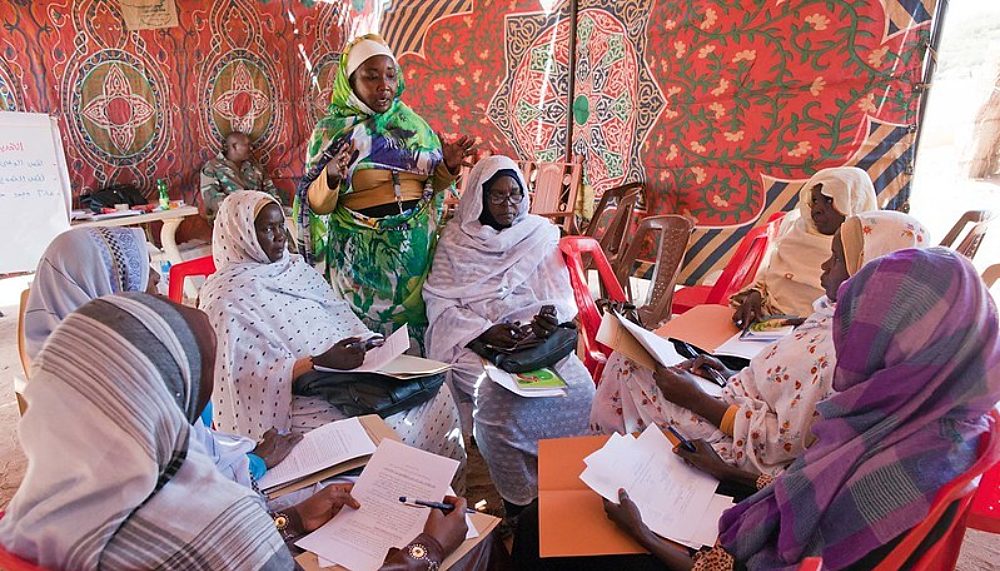FEATURE | 3 Nov 2021
We can do better!
Three ways how peacebuilding efforts can become more gender inclusive

These mechanisms can inform peacebuilding as a more inclusive practice where everyone has a seat at the table and the act of conflict-sensitivity is reinforced.
Twenty years after the launch of UNSC Resolution 1325 on Women, Peace and Security (WPS), the need for gender mainstreaming and the inclusion of women is widely accepted in the peacebuilding sector and beyond. But when speaking with peacebuilding practitioners from around the world, they often find programming for peace to be far from inclusive, let alone intersectional or challenging the causes of gender inequality. Such ‘gender-transformative’ programming would address the underlying structural causes and factors of gender inequality, such as norms and power relations, and explicitly aim for gender equality.
While women only play a marginal role in most peace processes and peacebuilding efforts, the often protection-focused WPS programming regularly reduces their role in conflicts to that of victims, thereby stripping them of their agency. The Berghof Foundation seeks to address this by exploring more nuanced understandings of the WPS agenda and by supporting women in resistance and liberation movements in contributing to conflict transformation in meaningful ways.
As part of our 50th anniversary event series, we hosted an online panel discussion to map out existing gaps in the WPS agenda. Based on the discussion with speakers and participants from five regions (North and South America, Asia, Africa and the Middle East) and diverse backgrounds, we identified three ways how peacebuilding efforts can become more gender-transformative.
1) Applying gender-sensitive conflict analysis to understand the root causes of conflict – and find solutions
In peacebuilding projects around the world, we still see minimal implementation of WPS relevant interventions, despite a general consensus on how important and overdue a focus on such interventions are. This is partly founded in a lack of understanding of the gendered dynamics of the root causes of conflicts on the side of the political decision-makers. Other actors, however, do not only understand these dynamics but are often already taking advantage of them. Take Boko Haram, who organize mass weddings for their members to motivate young recruits, who otherwise would not be able to afford the steep bride prices, as a recruiting strategy. At the Berghof Foundation, we explore questions like this in our work to examine and promote gender-sensitive approaches to the prevention of violent extremism.
When supporting local actors it is important never to speak for them but to raise the issues of gender dynamics, emphasising how important it is for the outcome.
Canada’s Ambassador for Women, Peace and Security, H.E. Jacqueline O’Neil
Gender-blind interventions can perpetuate harmful gender norms, thereby missing the mark of conflict-sensitivity and resulting in a low chance of inspiring sustainable long-term change. To avoid this, some donors such as the EU and the German Federal Foreign Office have been taking first careful steps towards the integration of gender in their efforts to foster peace and security. Our sister organisations in the peacebuilding field are taking steps in similar directions: Conciliation Resources and Saferworld, just to pick one example, have developed a hands-on tool kit for gender-sensitive conflict analysis. These are crucial steps devising sustainable peacebuilding projects and gaining a better understanding of the role women play as drivers of peace and conflict.
2) Thinking outside the binary – going beyond men and women
While “gender” is by now widely recognised as a socially constructed category, analyses often still only consider the masculine/feminine binary. In conflict contexts, violence against the LGBTQIA+ community is often widespread and serves a number of purposes for its perpetrators, e.g. when armed conflict parties are enforcing gender hierarchies based on militarised masculinity in order to portray themselves as the enforcers of the “moral order” and thereby score political gains. Fernando Serrano Amaya (Universidad de los Andes, Colombia) stressed that homophobic violence needs to be recognised as part of sexualised and gender-based violence. It is therefore an integral factor to keep in mind in order to understand how gender dynamics play out during and after conflict.
3) Supporting the grassroots – Enhancing local activism will go a long way
The fact that quite progressive, gender-inclusive language was included in the Colombian peace agreement largely goes back to the long-standing work of local activists, who built alliances with relevant actors and fed back into the negotiations in Havana. Local activists play a decisive role in their communities in contributing to peace, often putting in a lot of efforts and taking great personal risks. However, in many cases international aid is not responsive to local needs and contexts, and often it is not even accessible for local activists due to language barriers and bureaucratic hurdles. Shadia Marhaban (Mediator and Former Free Aceh Movement (GAM) Negotiator), emphasised that women in Aceh face great obstacles to join the political arena in post-conflict Aceh, while international support centred on livelihood programmes is not very effective in contributing to women’s empowerment. In order to ensure women’s political participation, it is crucial to gain a better understanding of the challenges they face and tailor the support to local needs.
Real transformation only happens at the local level. Building alliances, supporting networks of activists across identity lines and really listening to them are therefore key ingredients for successful and sustainable conflict transformation.
Working on peacebuilding and conflict transformation, donors and international organisations can do much more to design and implement gender-transformative programming. Berghof is committing itself to do better. We encourage you to do so too!
Media contact
You can reach the press team at:
+49 (0) 177 7052758
email hidden; JavaScript is required


